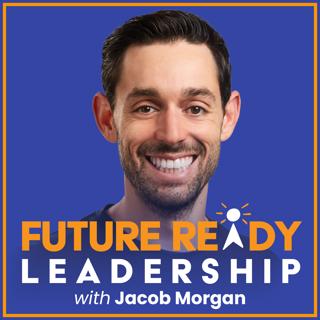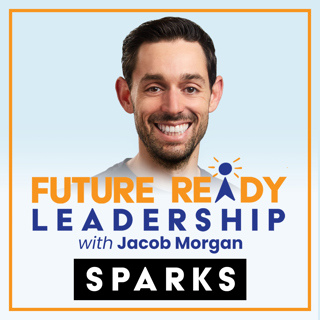
Sparks: Leaders Should Level Up! Learn to Go from Version N to N+1 with Synopsis Founder Aart de Geus
The old thinking of being a strong leader means never showing weakness is getting way too old. Too many leaders are so busy trying to be “perfect” that they end up stuck in the old version of themselves, while the world zooms past them. Refusing to acknowledge your gaps actually makes you a worse version of yourself over time. You might think you’re already doing great, but if you’re not constantly updating and improving yourself—what Aart de Geus, founder and chair of Synopsys, calls moving from version N to version N+1—you’re actually falling behind. In today's Leadership Spark, I dive into one of the most misunderstood yet essential aspects of leadership—leading with vulnerability. I’ll share insights on why acknowledging your gaps and actively working to close them is the key to unlocking your potential and driving real business performance. ________________ Start your day with the world’s top leaders by joining thousands of others at Great Leadership on Substack. Just enter your email: https://greatleadership.substack.com/
30 Elo 20244min

Embracing Changes in the Leadership Landscape with McKinsey's Kurt Strovink
What does it take to be a successful leader today? In this episode, Kurt Strovink, Head of Global CEO Services at McKinsey, explores the evolving challenges of leadership. We’ll discover why leadership has become more complex in recent years and how leaders can stay ahead by embracing human-centric leadership and vulnerability. Kurt delves into balancing purpose with business demands, offering strategies like integrating sustainability and innovation and asking the “Four W” questions to create a meaningful workplace. He also discusses the shift from transactional to holistic learning through peer coaching and reflective spaces, the power of role modeling, and the impact of storytelling. Listeners will learn about the importance of empowered networks, managing leadership loneliness, and why energy maintenance is crucial. ________________ Start your day with the world’s top leaders by joining thousands of others at Great Leadership on Substack. Just enter your email: https://greatleadership.substack.com/
26 Elo 202445min

Sparks: 3 Strategies That Encourage Taking Risks and Driving Innovation
Is your organization struggling to drive innovation? It may be because your employees are hesitant to take risks. Simply telling them to “take more risks” isn’t enough; they need the right environment and support. They may avoid risk-taking because of fear of failure or lack of recognition, leading to stagnation and missed opportunities. In today’s Leadership Spark, I outline three strategies to encourage risk-taking and drive innovation: creating psychological safety, rewarding desired behaviors, and providing resources and support. You’ll learn how to create a culture that promotes innovation through calculated risk-taking by implementing these strategies. ________________ Start your day with the world’s top leaders by joining thousands of others at Great Leadership on Substack. Just enter your email: https://greatleadership.substack.com/
23 Elo 20248min

How the CEO of Torani Built a $500M People-First Company Without Layoffs
What does it take to build a century-old company that has never laid off a single employee? In this episode, we’ll explore how CEO Melanie Dulbecco grew Torani into a $500 million powerhouse with a people-first leadership approach. Melanie shares the secrets behind the company’s remarkable history and its unwavering commitment to giving employees agency, control, and choice in their work. She mentions why they replaced old-school performance reviews with a system focused on growth and development, known as “Contribution Management,” and how they’ve created a culture of internal mobility, or “Career Mixology,” where employees can explore different roles within the company. We also dig into their unique compensation strategy, featuring above-market pay and employee ownership, which kept their employees engaged and loyal. Plus, Melanie shares her take on Gen Z’s work ethic and how Torani used futurist thinking and scenario planning to foresee a potential 20% market drop during COVID-19, ensuring stability and a commitment to 100% employment. ________________ Start your day with the world’s top leaders by joining thousands of others at Great Leadership on Substack. Just enter your email: https://greatleadership.substack.com/
19 Elo 202447min

Sparks: Participation Trophies are a BAD Idea! Here’s Why
Imagine running a marathon only to find that the person who strolled in hours later gets the same prize as you. This is exactly the problem with metaphorical participation trophies in the workplace. What happens when high performers see no difference in recognition between their hard work and others’ minimal efforts? Equalizing rewards creates a false reality, diminishes motivation for top performers, fosters a culture of entitlement, and stifles improvement. In today’s Leadership Spark, we’ll discuss the importance of performance-based recognition, understand why real rewards should reflect real performance, and emphasize that true achievements come from hard work and results. Let’s advocate for a workplace where effort and excellence are genuinely rewarded to create an environment that encourages continuous growth and dedication. ________________ Start your day with the world’s top leaders by joining thousands of others at Great Leadership on Substack. Just enter your email: https://greatleadership.substack.com/
16 Elo 202410min

Why You Need a Change to Modern Management with Frederic Laloux
Is your company still stuck in the same old top-down management approach? It’s time to ditch that old playbook. In this episode, Frederic Laloux, Author of “Reinventing Organizations” and Co-founder of The Week, discusses why organizations need to reinvent traditional management approaches in today’s fast-paced world. He breaks down why outdated hierarchical structures often fail to engage employees and the flawed mentality of working solely for a paycheck. We also dig into the evolution of management models and how we’ve moved from rigid structures to more dynamic, people-first approaches. Frederic also discusses real-world examples of self-managing companies where teams thrive without the usual layers of management. He also shares stories from companies like Bayer and Zappos about the challenges and successes in adopting new management styles like “holacracy.” ________________ Start your day with the world’s top leaders by joining thousands of others at Great Leadership on Substack. Just enter your email: https://greatleadership.substack.com/
12 Elo 202444min

Sparks: Working for a Younger Leader: Should It Bother You?
We often hear the famous words "age doesn't matter,” but it’s not really an easy thing to accept in the context of leadership. In today's Leadership Spark, we’ll tackle this common concern: the unease of working under a leader who's younger than you. It's a frequent issue because we often equate age with experience. The situation becomes particularly challenging if the younger leader lacks the necessary skills. A younger leader who is adept, knowledgeable, and capable of motivating and challenging their team should be respected regardless of their age. Leadership effectiveness is about skill, vision, and interpersonal abilities, not the number of years one has lived. I explain why we should focus on these qualities rather than age. ________________ Start your day with the world’s top leaders by joining thousands of others at Great Leadership on Substack. Just enter your email: https://greatleadership.substack.com/
9 Elo 20244min

Leading a Culture of Accountability with Calix CEO Michael Weening
Culture is not a finite element but something we shape daily through our interactions. But how can we create a thriving culture if no one takes ownership of their role in shaping it? In this episode, Michael Weening, CEO of Calix, discusses how leaders can foster a culture of accountability and emphasize our individual responsibility for shaping culture. He also addresses the damaging effects of victimhood in leadership and the workplace, highlighting the importance of taking charge of one's career and how leaders should guide team members in setting realistic goals. Michael shares why the CEO’s job can be tough and how the servant leadership mindset is often lost. We also touch on the necessity and extremity of change, and dig into the trends of “quiet vacationing” and the benefits and challenges of a fully remote setup. ________________ This episode is sponsored by Calix, which helps broadband providers of all sizes simplify their operations, innovate for their subscribers, and grow value for their business and the communities they serve. Learn more at calix.com. ________________ Start your day with the world’s top leaders by joining thousands of others at Great Leadership on Substack. Just enter your email: https://greatleadership.substack.com/
5 Elo 20241h 1min






















